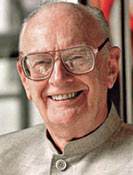
Arthur C. Clarke
1917-2008
Former Member of the National Space Society Board of Governors
Sir Arthur C. Clarke published more than 100 books. During the Apollo missions he made appearances on CBS with Walter Cronkite. He was a Council Member of the Society of Authors, a Vice President of the H.G. Wells Society, and a member of many scientific and literary organizations. His honors include several Doctorates in science and literature, a Franklin Institute Gold Medal, The Marconi Fellowship, the Charles A. Lindbergh Award, the UNESCO-Kalinga Prize, and an Oscar Nomination for the screenplay of 2001: A Space Odyssey.
Clarke originated the idea of geosynchronous communication satellites in Wireless World (1945) and the idea of the lunar mass-driver in the Journal of the British Interplanetary Society (1950).
Clarke lived in Sri Lanka since 1956, and in 1979 President Jayewardene appointed him Chancellor of the University of Moratuwa, near Colombo, which is the location of the government-established Arthur Clarke Institute for Modern Technologies. He was also Chancellor of the International Space University and Master of Richard Huish College, Taunton.
In 1989 he was made a Commander of the British Empire for “cultural services in Sri Lanka”. On returning to the U.K. in 1992 for his 75th birthday, he was made the first Freeman of Minehead. He was nominated for the Nobel Peace Prize in 1994, and in 1995 NASA gave him its Distinguished Public Service Medal. In 1998 he was knighted in the New Year’s Honours List for “services to literature”.






